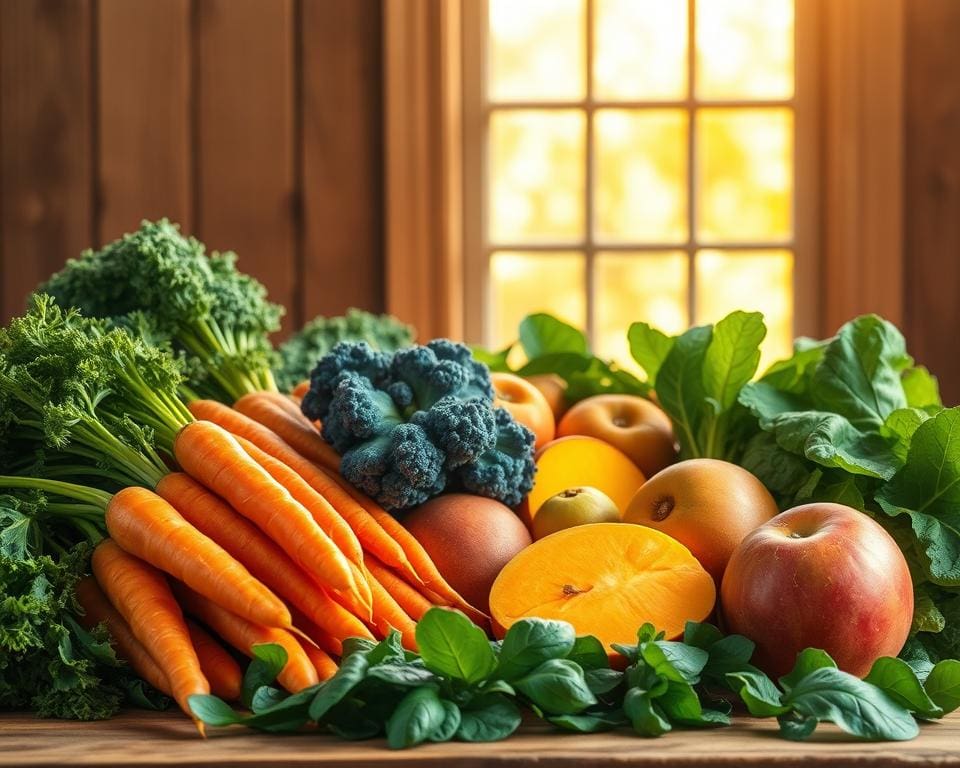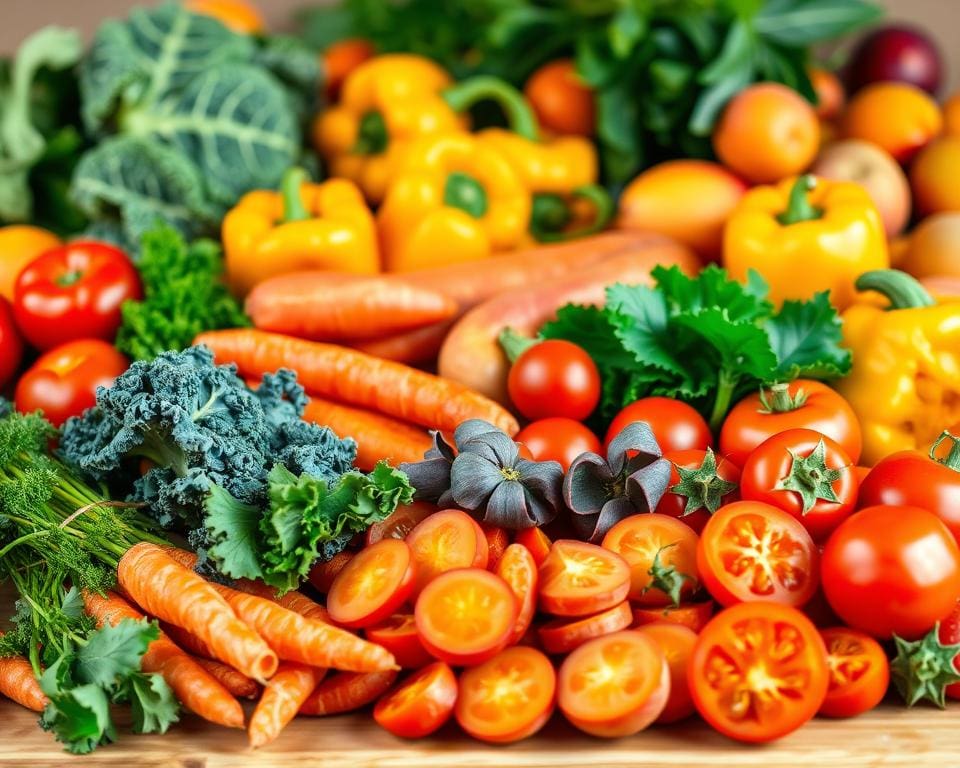Beta carotene is a powerful pigment found in a variety of foods, serving as a precursor to vitamin A and offering numerous health benefits. Understanding what foods are high in beta carotene is essential for anyone looking to enhance their wellbeing through diet. Foods rich in beta carotene not only contribute to a healthier body but also play a crucial role in maintaining good vision, supporting immune function, and acting as antioxidants. This section will illuminate the importance of incorporating beta carotene sources into your daily meals, paving the way for a vibrant, healthful life.
Understanding Beta Carotene and Its Benefits
Beta carotene, a member of the carotenoid family, serves as a vital nutrient for maintaining optimal health. This pigment provides the vivid colours in many fruits and vegetables, particularly those that are orange, yellow, and dark green. Understanding its fundamental role can inspire individuals to incorporate various beta carotene sources into their daily diet for enhanced wellbeing.
The Role of Beta Carotene in Health
As a precursor to vitamin A, beta carotene plays a significant role in numerous bodily functions, including immune support and cellular health. Its conversion into vitamin A is crucial for maintaining healthy skin and mucous membranes, essential for protecting against infections. By improving the body’s defence mechanisms, the health benefits of beta carotene extend to overall wellbeing and disease prevention.
Antioxidant Properties of Beta Carotene
The antioxidant properties of beta carotene are well-documented. This remarkable compound combats oxidative stress caused by free radicals, which can damage cells and contribute to chronic diseases. A consistent intake of beta carotene-rich foods may lower the risk of heart disease and certain cancers, reinforcing its importance for long-term health.
How Beta Carotene Supports Vision
Beta carotene is especially famous for its role in maintaining good vision. This nutrient is vital for the formation of rhodopsin, a protein in the eyes that enables sight in low-light conditions. Additionally, it may help prevent age-related macular degeneration, a leading cause of vision loss in older adults. Ensuring a diet rich in beta carotene can be a proactive measure for protecting eyesight.

What Foods Are High In Beta Carotene
Choosing a diet rich in nutrient-dense foods can transform your overall health. The importance of a beta carotene-rich diet lies in its myriad of benefits, particularly for skin health, immune function, and overall vitality. Foods containing beta carotene offer essential nutrients that not only help maintain good health but can also prevent various diseases.
Importance of a Beta Carotene-Rich Diet
Incorporating sufficient beta carotene into daily nutrition can lead to incredible health improvements. This powerful antioxidant plays an essential role in supporting skin health, giving it a radiant and youthful appearance. Additionally, beta carotene contributes to a well-functioning immune system, providing the body with a robust defence against infections.
Regular consumption of foods containing beta carotene can significantly enhance one’s vitality. These foods are often high in fibre and low in calories, promoting not just physical well-being but also contributing to mental sharpness.
Emphasising the importance of a beta carotene-rich diet can pave the way for improved long-term health. As research continues to demonstrate the advantages of a vibrant diet, making informed choices about the foods you consume becomes paramount. Enhance your lifestyle by integrating these potent sources of beta carotene into your meals for a vibrant, energetic future.
Top Beta Carotene-Rich Foods
Exploring top beta carotene-rich foods opens a vibrant world of nutrition. Various vegetables and fruits provide not only this essential nutrient but also enhance the overall flavour and colour of your meals. Incorporating these foods into your diet can be both delicious and beneficial for health.
Vegetables High in Beta Carotene
Among the remarkable vegetables high in beta carotene, carrots lead the way, offering a crunchy texture and sweet flavour. Sweet potatoes are another fantastic option with their creamy consistency and earthy taste, making them perfect for a comforting side dish. Butternut squash brings a rich, nutty profile that pairs well in soups and salads.
Leafy greens like spinach and kale contribute a wealth of nutrients as well. These nutrient-dense vegetables are versatile and can easily be added to smoothies, stir-fries, or salads, ensuring an effortless way to boost your beta carotene intake.
Best Sources of Beta Carotene in Fruits
When it comes to fruits with beta carotene, mangoes and apricots shine brightly. Mangoes offer a tropical flavour, perfect for snacking or adding to smoothies, while apricots provide a succulent taste that complements salads or can be enjoyed dried. Incorporating these fruits can add not only colour but also a hint of sweetness to your meals.
How to Incorporate Beta Carotene Foods into Your Diet
Incorporating a variety of beta carotene-rich foods into your meals can enhance both your nutrition and culinary experience. Embracing cooking with beta carotene opens doors to vibrant colours and delightful flavours, transforming everyday dishes into nutritious celebrations. The following suggestions provide inspiring recipe ideas alongside useful meal planning strategies to make this easy and enjoyable.
Tasty Recipe Ideas Featuring Beta Carotene
When exploring your beta carotene food list, consider these tasty ideas:
- Sweet potato mash paired with a hint of cinnamon for a comforting side dish.
- Carrot and ginger soup, blending the earthy sweetness of carrots with zesty ginger.
- Berry and mango smoothie enriched with spinach, offering a fresh and nutritious drink.
- Roasted butternut squash salad with walnuts and feta cheese, combining textures and flavours harmoniously.
Meal Planning for a Beta Carotene-Rich Diet
To ensure you consistently include these colours in your diet, meal planning for a beta carotene-rich diet can be extremely helpful:
- Start your week by selecting a variety of vegetables and fruits from your beta carotene food list.
- Prepare a batch of soups or stews that can be easily reheated for quick lunches.
- Create a colourful salad with vibrant ingredients, making it the star at dinner time.
- Incorporate beta carotene-rich snacks, such as carrot sticks with hummus, for healthy munching.
Introducing these inspiring recipes and planning ideas will enhance your daily meals while making the most of the benefits that beta carotene offers.
Comparing Beta Carotene Sources
Understanding the sources of beta carotene is essential for those aiming to enhance their dietary choices. Natural beta carotene, found in a variety of fruits and vegetables, typically offers higher bioavailability than its supplemented beta carotene counterparts. Whole foods not only provide a rich array of nutrients but also ensure that beta carotene is absorbed effectively by the body. For individuals considering their options, weighing the pros and cons of each can lead to more informed decisions.
Natural vs. Supplemented Beta Carotene
Natural beta carotene presents several advantages over supplemented forms. When derived from food, it comes packaged with a multitude of fibres and additional vitamins, resulting in better nutrient absorption. In contrast, supplemented beta carotene may not always be utilised efficiently, and there are concerns regarding its potential effects when consumed in high doses. Focusing on getting beta carotene through natural sources can significantly enhance overall health.
Identifying High-Quality Food Sources
Choosing high-quality food sources for beta carotene is vital for obtaining its maximum benefits. When selecting foods, consider the following:
- Opt for vibrant colours, as deep orange and dark green fruits and vegetables often indicate higher levels of beta carotene.
- Prioritise organic options where possible to avoid exposure to harmful pesticides.
- Incorporate a variety of sources, including carrots, sweet potatoes, and spinach, to achieve a balanced intake.
- Look for seasonal produce, which tends to be fresher and more nutrient-dense.
Top Tips for Maximising Beta Carotene Absorption
To truly benefit from beta carotene, it’s vital to focus on maximising beta carotene absorption within your body. One practical approach is to combine beta carotene-rich foods with healthy fats, such as avocado, olive oil, or nuts. These fats enhance the absorption of this important nutrient, allowing you to reap the full health benefits while enjoying delicious meals.
Incorporating certain cooking methods can also amplify the bioavailability of beta carotene. For instance, steaming or roasting vegetables like carrots, sweet potatoes, and butternut squash can break down cell walls and release more beta carotene for absorption. Avoiding boiling, which often drives nutrients into the water, will ensure you maintain their potency.
Moreover, pairing foods high in fat-soluble vitamins with beta carotene-rich options can be beneficial. For instance, a colourful salad with leafy greens, topped with carrot slices and a dressing rich in olive oil, not only provides an array of vitamins but also fosters optimal absorption of beta carotene. By implementing these tips for absorbing beta carotene, you can effortlessly enhance your diet and enjoy its valuable health advantages.









